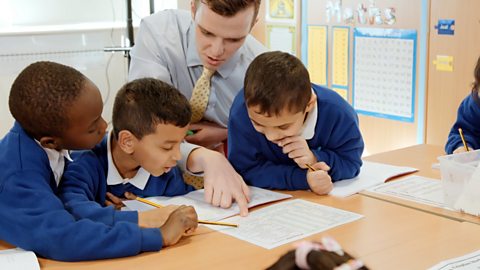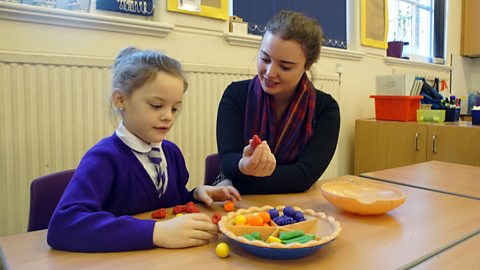Meet Annabel, a German teacher in a secondary school in Greater London. Find out more about how she uses German in her role. Part of our Bitesize world of work series.
She not only teaches German but also tries to shape her students' lives and look after their wellbeing both in and out of the classroom.
I use German everyday in my job. I even use it to chat with my colleagues!
Annabel:
Mein Name ist Annabel, und ich bin Deutschlehrerin. - My name is Annabel and I am a German teacher.
My name is Annabel and I am a German teacher. Although my main job is teaching German in a secondary school, the job includes so much more than that. So, for example, in the secondary schools, most teachers are also form tutors, which involves taking care of that group of children and supporting them to become well rounded individuals.
Fantastisch. - Fantastic.
Unsere Lernfrage heute ist «Wie ist dein Stundenplan?» - Our learning objective for today is “What is your timetable?”
As a teacher, no two days are the same. That's partly what makes it so enjoyable. So, on an average day, I get to work and make sure I have all my resources organised for the lessons I'll teach that day. I've recently been promoted, so instead of taking on form tutor responsibilities, I work with smaller groups of children to help them achieve their full potential. Once I've seen them, I get into teaching for the rest of the day.
Annabel:
Oh, dankeschön - Thank you.
Annabel’s colleague:
Vielendank. - Thank you very much.
Annabel:
Kein Problem. - No problem.
Annabel’s colleague:
Mm, ein Tasse Tee - wunderbar. - Mm, a cup of tea - lovely!
Annabel:
I use German every day in my job. I even use it sometimes to chat with my colleagues, and when teaching younger years, we use lots of transactional classroom language like sit down, get your book out, that kind of thing. But the language becomes more complex with each year group and by year 9, we introduce grammar and how to make our language more varied.
Student:
I meet with my friends.
Annabel:
By A-level, it's a completely different kettle of fish. I'm teaching the students how to write essays, as well as analysing films and German literature, so it is really a mixed bag.
Also, ein Punkt von sieben bitte? - Give it a mark out of seven, please.
It sounds cliché, but I do love the fact that maybe ten years down the line, a student might remember something I taught them and I also like forming relationships with my students. We really do have a laugh together and I'm strict, but at the same time, the kids I teach make me laugh every single day and that's what makes me happy because I enjoy working with young people. They just keep you on your toes.
So 'woch' is the week, so that's middle of the week.
Mittag… What's 'tag'?
The biggest challenge, I think is the frustration of students not believing in themselves. As teachers, we work so hard to try and convey to students that actually you can do anything when you put your mind to it.
Genau, ich entspanne mich mit meinem Freundin - Exactly, I relax with my girlfriend.
I started to learn German when I was about 12 at school and became really passionate about the language. I developed an interest in German when I was quite young as I visited Germany quite regularly with my mum, and I did GCSE and A-level and I loved it so much that I ended up doing a degree in German and Linguistics. I then completed a PGCE in German and French, which meant I could teach these languages at secondary school level. Which one of those is a feminine noun?
Kantine, ja, fantastisch. Canteen, yes, fantastic
To become a language teacher, it's crucial to have followed a recognised pathway into teaching, such as a degree, followed by a postgraduate teaching qualification or an apprenticeship, and of course you do need to be fluent in your chosen language. I would say that you need to be able to have fun and relax. Ultimately, if you're standing in front of a class and you're telling them all of this information, but you're not connecting with them, then the students aren't going to learn anything. So, you have to be able to build those relationships.
Die zweite Aufgabe: die Herausforderung. - The second task: the challenge.
I wish I'd known earlier in my teaching career to work smarter and not harder, because teaching, and I won't sugar coat it, it is hard. The workload high and you do have to learn how to manage your work without burning out. If you want to become a teacher, make sure you are truly invested in it and you're passionate about the subject that you're going to teach. My second tip would be to brush up on your knowledge as much as possible, because the kids can ask you the most random things and they expect you to know all of the answers. Lastly, if you're not a very organised person, find a way to organise yourself, because if you don't do that, then you're going to struggle. My top tips for language learning would be not to give up too easily. An employer will look at you, regardless of what job you do.
See your exam results and think "OK, this person knows how to talk, how to communicate and how to analyse." You never know where it may take you.
- Annabel uses a multitude of skills everyday. Her German knowledge is key to her role but she also needs to communicate well with her students and colleagues and it's crucial to be well organised if you want to be a teacher
- She learnt German at school. When she was a child, she went to Germany on holiday with her mum and it gave her that extra motivation to learn it
- Annabel studied German, Music and Biology at A-level. At university, she did her bachelor's in German and Linguistics. She then got a PGCE Secondary German and French qualification
- She feels that other subjects she studied at school proved useful to her role now: German of course, but History and Music as well
- Annabel enjoys that everyday is different at work. She always makes sure her teaching resources are ready for each lesson she teaches. She recently got promoted and instead of taking on form tutor responsibilities, Annabel works with smaller groups of children to help them achieve their full potential.

Top tips
- If you want to become a teacher, make sure you're truly invested in it and you're passionate about the subject you'll teach
- Brush up on your knowledge as much as you can, because students can ask you the most random things, and they'll expect you to know the answers!
- Find a way to organise yourself
- Don't give up too easily your language learning. You never know where it will take you!

What to expect if you want to be a secondary school teacher
- Secondary school teacher average salary: £25,714 to £41,604 per year
- Secondary school teacher typical working hours: 37 to 45 hours per week
What qualifications do you need to be a secondary school teacher?
You could get into this role via a university course, an apprenticeship or working towards the role.
Sources: LMI for All, National Careers Service
This information is a guide and is constantly changing. Please check the National Careers Service website for the latest information and all the qualifications needed.
Learn more about routes into teaching on the Get Into Teaching website.
For careers advice in all parts of the UK visit: National Careers Service (England), nidirect (Northern Ireland), My World of Work (Scotland) and Careers Wales (Wales).

How to become a teacher. collection
A collection of teacher job profiles and information about what the role entails.

Careers in education. collection
Find out what you could expect from a role in the education sector.

How I use modern languages in my career. collection
Find out more about careers that use modern languages.
